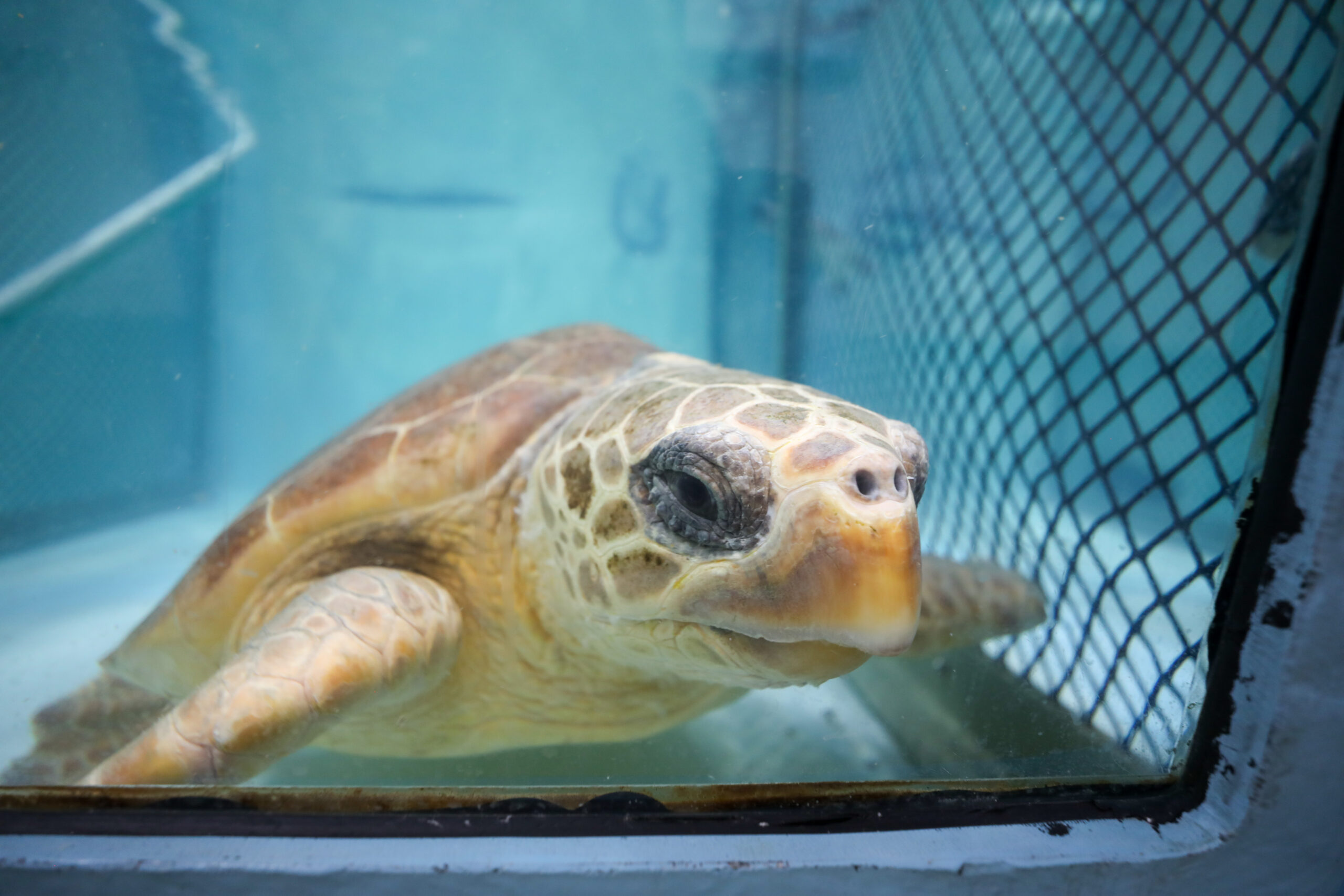On Thursday, May 29, The Trust Family Foundation Shark and Ray Touch Tank will be closed until 10:30 a.m. for routine animal care.

BOSTON, MASS. (Feb. 6, 2024) – Ahead of Valentine’s Day, dozens of sea turtles rehabilitating at the New England Aquarium have received flower-themed names as they continue recovering from hypothermia-related conditions before being released back into the ocean.
The annual sea turtle cold-stunning season came to a close in mid-January, with the Aquarium’s Sea Turtle Hospital in Quincy, MA, treating nearly 400 live turtles that stranded on the beaches of Cape Cod since November. While many stabilized turtles were transferred to secondary rehabilitation facilities to free up space for new arrivals, 53 of the more critical turtles are remaining at the Sea Turtle Hospital to undergo long-term treatment for life-threatening medical conditions.
Aquarium staff, volunteers, and interns have a tradition of naming the turtles receiving months-long care, with this year’s theme being flowers. The group includes Kemp’s ridley sea turtles “Rose,” “Peony,” and “Marigold.” The Aquarium is also rehabilitating several loggerhead sea turtles with names including “Water Lily,” “Dogwood,” and “Bird of Paradise.”
“This is the time of year when we shift our operations from triaging and stabilizing hundreds of turtles to the next critical phase. At this point, the focus is on those turtles that were too sick to be transported: Ensuring that the proper medical treatment is given, spending long hours coaxing the turtles to eat, and keeping a watchful eye on all of these animals’ behavior,” said Adam Kennedy, Director of Rescue and Rehabilitation at the New England Aquarium.
The turtles are expected to spend several months undergoing treatment for conditions including pneumonia, sepsis, bone infection, and dehydration, a result of becoming unable to regulate their body temperature in the cold waters of Cape Cod Bay. Aquarium veterinarians work with staff biologists to create individualized treatment plans for each turtle patient.
“Many of these animals still have severe infections or other disorders that require intensive treatment and advanced diagnostics,” said Dr. Melissa Joblon, the Aquarium’s Director of Animal Health. “Some of them may require surgery such as joint debridement for bone infection, lung biopsy for chronic pneumonia, or exploratory gastrointestinal procedures to ensure they will be healthy enough for release by the summer.”
Every fall and early winter, hundreds of cold-stunned sea turtles—the majority critically endangered Kemp’s ridleys—wash up on the beaches of Cape Cod. Because of the rapidly changing water temperature and wind pattern, many turtles cannot escape the hook-like area of Cape Cod Bay before becoming hypothermic. That’s when staff and volunteers with Mass Audubon’s Wellfleet Bay Wildlife Sanctuary come in, patrolling the beaches for stranded turtles and transporting the live animals to the Aquarium’s facility for treatment.
“Our dedicated volunteers and staff do a tremendous job scouring beaches for stranded turtles at all hours and in every kind of weather,” said Jessica Ciarcia, Turtle Research Coordinator at Mass Audubon’s Wellfleet Bay Wildlife Sanctuary. “Thanks to them and the work of all our partners, close to 500 sea turtles [between the New England Aquarium and National Marine Life Center] successfully made it to rehab this season.”
As the Sea Turtle Hospital fills up, the Aquarium works closely with the National Oceanic and Atmospheric Administration (NOAA) Fisheries Service and the non-profit organization Turtles Fly Too to transport some turtles to organizations that can continue the rehabilitation process and free up space for new patients in Massachusetts.
“With changing ocean temperatures pushing these turtles out past their normal habitats, the number of turtles being caught in waters too cold for their survival is increasing. That’s why it’s crucial for Turtles Fly Too, with our network of volunteer pilots who are ready at any moment, to provide medivac support. When every minute counts, a short plane ride can be what stands between life-saving rehabilitation and death,” said Leslie Weinstein, president of Turtles Fly Too.
“We transported 303 sea turtles out of Massachusetts this season. Most of those turtles were transported by generous private pilots, ‘Turtle Fliers,’ with Turtles Fly Too, but NOAA Fisheries Service also flew one turtle mission, and a smaller number were moved with ground transport,” said Kate Sampson, Sea Turtle Stranding and Disentanglement Coordinator with NOAA Fisheries. “These turtles went to 18 different facilities in 11 states. It is an amazing collaboration covering a wide geographic range, as far south as Juno Beach, FL, and as far inland as Springfield, MO.”
The Aquarium plans to release the majority of its rehabilitated sea turtles off Cape Cod into Nantucket Sound once the water temperature is warm enough this summer. Turtles that are ready to return to their ocean home sooner may be transported further south for release in the springtime.
The Aquarium is also continuing its sea turtle advocacy work. During Massachusetts school vacation week, Feb. 19–23, the Aquarium will offer visitors an opportunity to help protect endangered sea turtles. Guests can stop by the Blue Planet Action Center during their visit to learn more about the Aquarium’s sea turtle rescue and rehabilitation program and write to their members of Congress to encourage their support of critical conservation efforts.
MEDIA CONTACT: Pam Bechtold Snyder, psnyder@neaq.org; 617-686-5068
